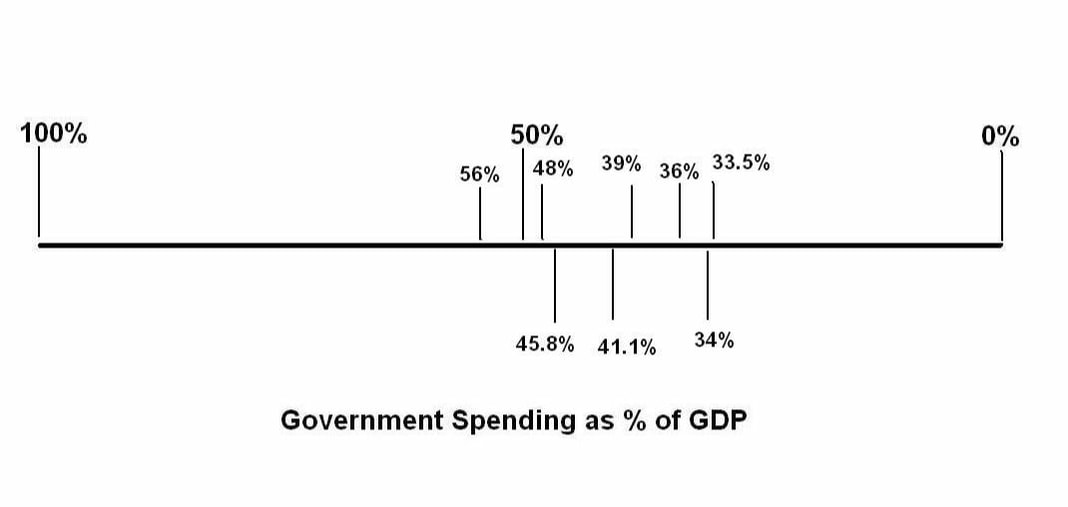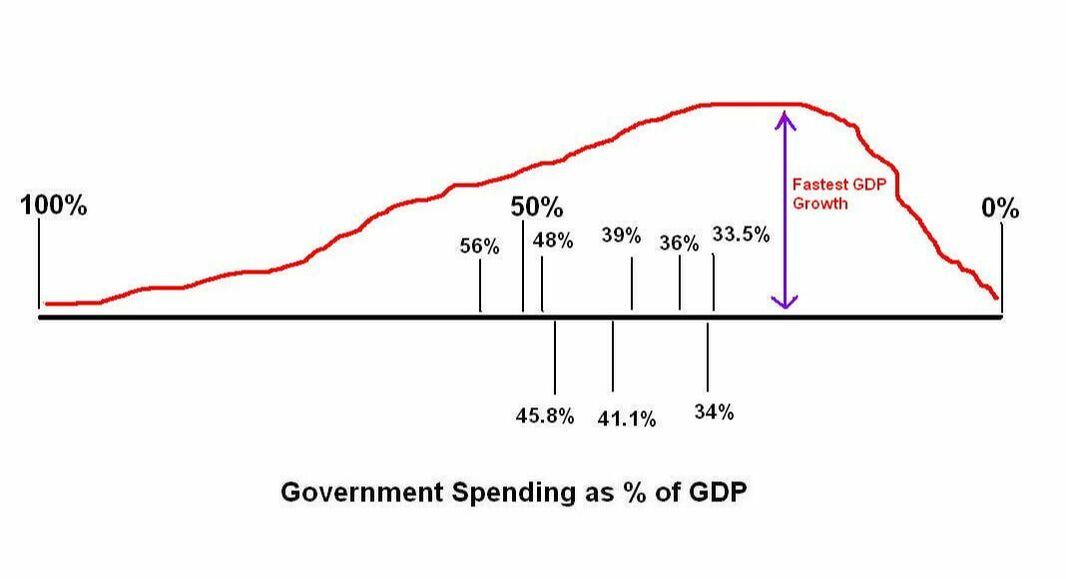|
So how do various Governments shape-up on their Levels of Spending?
As with all the Pictures here I have created them using Microsoft Paint and I find it unbelievably difficult to use and I suspect much of this is because in a former life I did all such Image creation using Microsoft Powerpoint which I found superb and very intuitive. Paint could most definitely never be called ‘intuitive’ !!
If you click on the picture it should grow bigger to help you see the detail.
Anyway, because it has taken me hours and hours just to create these simple Pictures, rather than putting the names of various Countries on I have left it merely with those percentages and I will now provide a ‘key’ as Bullet Points (please note, there is nothing clever here and I merely used Google to ask questions like “What % of GDP is Government Spending in Sweden?” and that sort of thing and these are the most recent Numbers I could find - but this is more to illustrate a concept than for 100% accuracy):
PS. I hope you like my newly discovered Microsoft Paint skills…… How does the Level of Spending affect Growth in GDP? From what you have read so far you might have got the sense that the Level of State Spending and the amount of the Economy that is in effect controlled by the State can impact upon the level of GDP Growth. Without doubt this is the case (and we mustn’t forget the impact of Regulation as well which I will come onto in a bit) and you can see in the Percentage figures for the Countries above that GDP Growth has a clear relationship to State Spending. On the Chart below I have tried to model the kind of impact the Level of State Spending would have on GDP Growth but this is by no means scientific and if you want more details then you would need to trawl around on the Web. Apologies for the wobbly Line on the Graph as well - I had to draw ‘Free-hand’ using Microsoft Paint and it was not easy but my intent was just to give some sort of idea of what the Graph would look like. I have used the Chart we showed earlier and just drawn on the Red Line and obviously the distance from the Bottom Axis represents the Level of GDP Growth and the larger the distance, the faster the Growth. Note how at the far Right end of the Axis the Level of GDP Growth falls off quite sharply and this is related to what I mentioned earlier in this Blog Series about how you would get anarchy and chaos at such Levels because there would be no effective system of Law & Order etc. Equally as you go to the Left on the Chart the level of GDP Growth steadily falls away and it is quite possible that once you get to a very high Level (maybe up around 85% or so) you actually start to find that GDP Growth goes negative - I have not shown this on the Chart because I am unsure if that would happen. In reality, I doubt anyone has managed it because as I mentioned with the USSR, once you get to a certain Level the Black Market takes over and you get a lot of ‘Free Market’ activity anyway.
Over-regulation
This is a particular bugbear of mine and probably the Number 1 reason why I am keen for the UK to escape the dead hand of the European Union. In a similar way to the concepts that I have gone through previously in this Blog Series with regards to levels of State Spending, the concept of Regulation, and more nastily that of Over-regulation, can put a drag on an Economy and result in sub-optimal outcomes and make everyone in the Society poorer than they need to be. I am in no doubt that Western Economies are suffering from this malaise even if they appear to have relatively low levels of State Spending. The classic example of this is Japan which as we saw earlier, only spends around 39% under State control but has one of the most sluggish and moribund Economies in the World - and this is down to Over-regulation and too much ‘rigidity’ and lack of dynamism within the Japanese Economy. It is just an obvious, self-evident and simple fact (‘prima facie’ if you like) that Governments all over the Western World are constantly adding new Laws and Regulations to their Statue Books (and don’t forget we also get ‘Case Law’ in the UK as well) but they almost never remove any Legislation. So it is a simple fact that the Laws and Regulations in Western Economies are just growing and growing and growing. This is clearly apparent when you see the bits of TV footage where they are digging out the archives of various bits of UK Statutes and they are having to blow the eons of dust from various bits of old Deerskin Vellum Parchment or whatever it is. It is madness really and it would perhaps be better if nearly all new Statutes had ‘Sunset Clauses’ in them where the Law in effect expires unless it is reviewed and renewed. Many Left-wing obsessives will probably think this is a good idea, but it creates many problems which simply bog-down an Economy and this results in Living Standards of the Population barely improving (if at all) and I suspect it is a big reason for the huge Wealth disparities between the Wealthy Elites and the Masses, and hence all the protest movements and boost to radical Political Parties that we have seen in recent years. The most obvious problem of too much Regulation is that it squeezes out Small and Dynamic Businesses and it entrenches the position of Large Businesses which tend to become more and more Monopolistic and as I have explained earlier, this has considerable drawbacks for a Society. Take the example of ‘Paternal Leave’. I would imagine that the instant reaction of 99% of the Population is that this is a good thing, and it may well be. However, it is not cost-free. Imagine what impact Paternity Leave has on a Business with 8,000 Employees - I would guess it would not be too bad as there are lots of other workers to cover for any who go on Paternity Leave and they would have the flexibility and the mix of skills to make this quite manageable. However, what happens in a Small Business with 8 Employees? If just 1 Worker goes off because there is a new Arrival in the family, it means that the Small Business takes a hit of 12.5% of the Workforce and not just that, this Lucky new Father might have special Skills that no one else in the Business has. For example, they could be the Accounts Person and this would mean that the Company would need to employ a Replacement at very high cost to cover the absence. Another example is around how Regulation can often have ‘unintended consequences’. Back when I was a young lad (blimey, now we are going back !!) it was entirely commonplace for 15 and 16 year olds to have Saturday Jobs and indeed I started working at Bejam Freezer Centres when I was just 16 and worked part-time for them whilst in the sixth form at School doing Thursday nights and Friday nights and all day Saturday and also I would work through the various holiday periods if the work was available. The amazing thing is that these days kids just don’t do work in this way and the main reason seems to be that the introduction of CRB Checks to avoid Adults doing dodgy behaviour with kids has made it too difficult for Shops and suchlike that have Adults working there to employ anyone under 18. To do so would require all Adults in a Shop or Factory or Warehouse or whatever to have CRB Checks and this would be a lot of hassle and additional expense. It is just easier not to bother employing kids anymore. I won’t go into this in too much detail, but another example is that of Pensions. The current Government thinking is that all Businesses have to provide ‘Workplace Pensions’ and this on the face of it appears to be a good thing. However, it could easily be argued that it is yet another burden on a Business that does not actually result in the best outcomes and it might be much better to allow the Business to do what it is good at and let someone else deal with Employee Pensions (for example, the Employees themselves could take responsibility !!). To embellish this more, there is a strong argument that Collective Pension Schemes run by the State would actually result in big Economies of Scale and of course free up Businesses - People would pay into such a State Pension Scheme in a similar way to how they would pay into a Company Scheme. These are just a few simple examples but imagine the cumulative impact of layers and layers of such Regulations which are imposed from well-meaning but simplistic Government Policies. I think we have now got to the point in the UK where it is pretty much not worth the hassle of starting a new Business and this situation will only get worse unless there is a huge rethink on how we organise Society and the Economy and People will simply have to learn that you cannot ‘Have your Cake and Eat it’…….. Crowding Out There are several definitions of the precise meaning of ‘Crowding Out’ in terms of Economic theory and stuff but in essence it is a situation where the State grows and in effect squeezes out the Private Sector which would otherwise provide Products or Services or Investment in an Industry etc. In fact, there are various ways in which Government provided Supply to an Industry/Sector can crowd out the Private Sector and these could be for example:
The obvious issue with such Crowding Out is that it can result in inefficient delivery of a Product or Service and State provision can often lead to old-fashioned and dated practices within an organisation especially if it is in effect a Monopoly. We had plenty of examples of precisely this kind of thing back in the 1960s and 1970s and it was only once Thatch privatised various previously State-run businesses like British Telecom (BT), British Gas, Rolls Royce, National Grid, the Water Companies etc. etc. that there was a huge leap forwards in the quality of the Service provided and the efficiency of how the organisations were run (and a lot less Strikes !!). When you think about it it is pretty shocking that getting a Home Phone back in the 1980s could take months and months and when I was a kid we had a ‘Party Line’ where our Phone was connected to our Nextdoor Neighbour’s Phone and when we picked the handset up we could hear them talking !! Now you can go into a Vodafone Shop and walk out with a Mobile Fone in a matter of minutes !! Here’s the Wikipedia link to Crowding Out: https://en.wikipedia.org/wiki/Crowding_out_(economics) Regards, WD
0 Comments
Leave a Reply. |
'Educational' WheelieBlogsWelcome to my Educational Blog Page - I have another 'Stocks & Markets' Blog Page which you can access via a Button on the top of the Homepage. Archives
May 2024
Categories
All
Please see the Full Range of Book Ideas in Wheelie's Bookshop.
|




